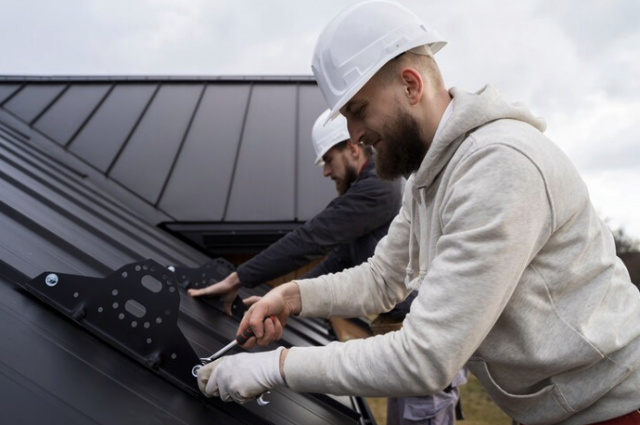When it comes to installing a metal roof, finding the right contractor is crucial. Metal roofing offers durability, energy efficiency, and aesthetic appeal, but its performance largely depends on the quality of installation.
Therefore, evaluating metal roofing contractors thoroughly is essential to ensure a successful project. In this article, we’ll delve into the key factors you should consider when evaluating metal roofing contractors.
Experience and Expertise
One of the primary factors to consider when evaluating metal roofing contractors is their experience and expertise in the field. Look for contractors who have a proven track record of successfully completing metal roofing projects. Consider the following aspects:
- Years in Business: A contractor who has been in the business for many years is likely to have extensive experience and a solid reputation in the industry.
- Specialization in Metal Roofing: Ensure that the contractor specializes in installing metal roofing systems rather than just offering it as one of their services. Specialization indicates a deeper understanding of the unique requirements and challenges associated with metal roofing.
- Portfolio of Completed Projects: Request to see a portfolio of the contractor’s completed metal roofing projects. This will give you a sense of their workmanship, attention to detail, and the variety of projects they have undertaken.
- Certifications and Training: Check if the contractor holds any certifications or has received specialized training in metal roofing installation. Certifications from manufacturers or industry organizations demonstrate a commitment to quality and professionalism.
Reputation and References
The reputation of a metal roofing contractor speaks volumes about their reliability, integrity, and the quality of their work. Here’s how you can assess a contractor’s reputation:
- Online Reviews and Ratings: Search for reviews and ratings of the contractor on trusted platforms such as Google, Yelp, or Angie’s List. Pay attention to both the quantity and quality of reviews, as well as how the contractor responds to any negative feedback.
- Referrals from Previous Clients: Request references from the contractor and reach out to past clients to inquire about their experience working with them. Ask specific questions about the contractor’s communication, professionalism, adherence to timelines, and the quality of the finished roof.
- Better Business Bureau (BBB) Rating: Check the contractor’s rating with the Better Business Bureau to see if there have been any complaints filed against them and how they were resolved. A high BBB rating indicates a commitment to customer satisfaction and ethical business practices.
Insurance and Licensing
Before hiring a metal roofing contractor, it’s essential to verify that they are properly licensed and insured. Here’s what to look for:
- License: Ensure that the contractor holds the necessary licenses required by your state or local jurisdiction to perform roofing work. A valid license demonstrates that the contractor has met the minimum competency requirements and is authorized to operate legally.
- Insurance Coverage: Verify that the contractor carries adequate liability insurance and workers’ compensation insurance. Liability insurance protects you against property damage or injuries that may occur during the project, while workers’ compensation insurance covers any injuries sustained by the contractor’s employees while working on your property.
- Bonding: Some states may require roofing contractors to be bonded, which provides financial protection to the homeowner in case the contractor fails to complete the project as agreed or fails to meet other contractual obligations.
Warranty and Guarantees
A reputable metal roofing contractor should stand behind their workmanship and offer comprehensive warranties and guarantees. Consider the following aspects:
- Manufacturer Warranty: In addition to the contractor’s workmanship warranty, inquire about the warranty provided by the metal roofing manufacturer. Most reputable manufacturers offer warranties on their products, which cover defects in materials and manufacturing.
- Workmanship Warranty: Ask the contractor about their workmanship warranty, which should guarantee that the installation is free from defects in workmanship for a specified period after completion. Make sure you understand the terms and conditions of the warranty, including what is covered and for how long.
- Satisfaction Guarantee: A contractor who is confident in their abilities and committed to customer satisfaction may offer a satisfaction guarantee, promising to address any issues or concerns to your satisfaction.
Communication and Customer Service
Effective communication and excellent customer service are essential throughout the roofing project. Here’s what to consider:
- Accessibility: Evaluate how easy it is to reach the contractor and how responsive they are to your inquiries, whether by phone, email, or in person. Prompt and clear communication is crucial for addressing any concerns or changes during the project.
- Transparency: A reputable contractor should be transparent about their pricing, timeline, and the scope of work involved in the project. Avoid contractors who provide vague or evasive answers to your questions.
- Professionalism: Pay attention to the contractor’s professionalism and demeanor when interacting with you. They should be courteous, knowledgeable, and respectful of your time and property.
Conclusion
Choosing the right metal roofing contractor requires careful consideration of various factors, including experience, reputation, insurance, warranties, and communication.
By thoroughly evaluating potential contractors based on these key factors, you can ensure a successful and stress-free metal roofing project that enhances the durability, energy efficiency, and aesthetic appeal of your home.
By Chris Bates








